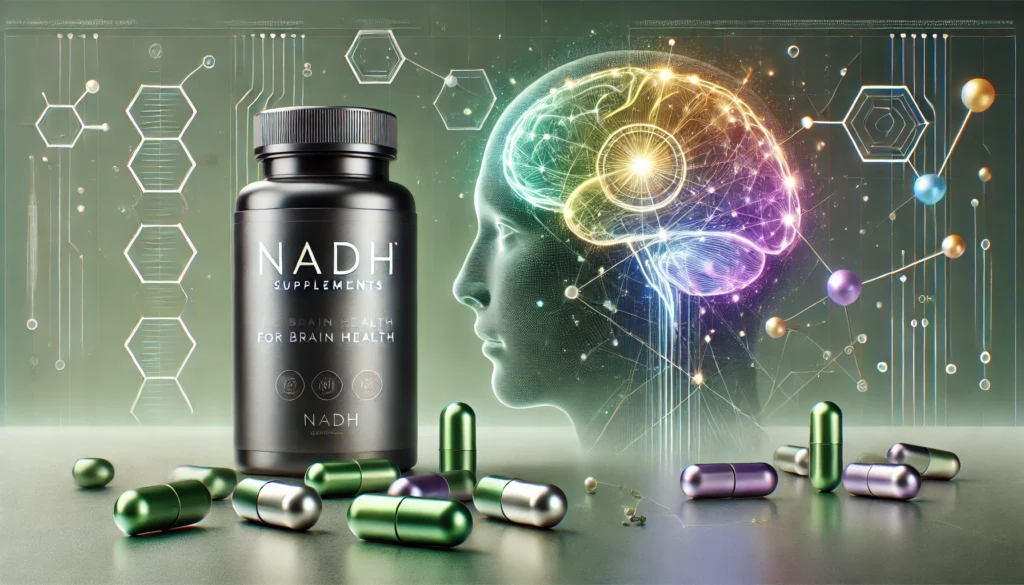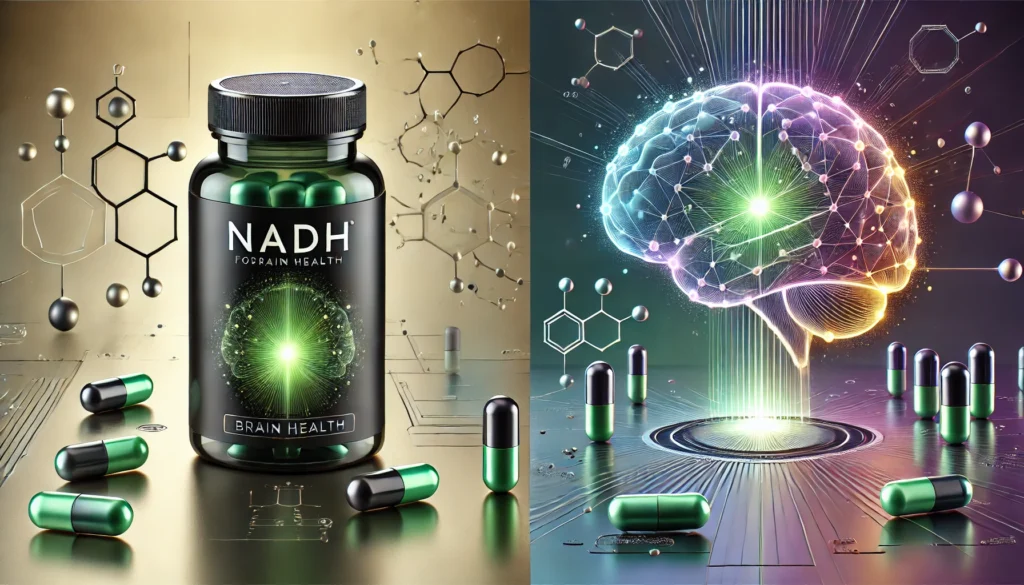NADH, short for nicotinamide adenine dinucleotide (NAD) + hydrogen, is a naturally occurring coenzyme derived from vitamin B3, also known as niacin. It plays an essential role in cellular energy production and numerous biochemical processes in the body. As an active form of NAD+, NADH is involved in redox reactions that help convert food into cellular energy, influencing both body and brain function. With its role in cellular metabolism and mitochondrial function, NADH has gained attention as a potential nootropic—a supplement that may support cognitive function and overall brain health. This article will explore the chemistry, physiological mechanisms, nootropic potential, dosage, side effects, and potential interactions of NADH.
You May Also Like:
Sources of NADH
NADH is naturally found in various foods, particularly those high in vitamin B3 or containing related precursors. While dietary sources can help increase NAD+ and NADH levels, many individuals turn to supplements to boost NADH, especially for potential cognitive benefits. Here are common sources of NADH:
- Animal-based foods: Meat (especially poultry and fish), dairy products, and eggs are rich in B vitamins and naturally contain small amounts of NADH.
- Plant-based foods: Though not as rich in NADH, vegetables like broccoli, spinach, and asparagus contain niacin, which helps support NAD+ levels in the body.
- Supplements: NADH is available as an oral supplement, often marketed as a means to increase energy, support mental clarity, and enhance cognitive function.
While diet alone may not significantly boost NADH levels, supplementation offers a direct way to increase NADH availability in the body and brain.

Chemistry of NADH
NADH is a coenzyme composed of two nucleotides: one containing an adenine base and the other nicotinamide. This structure allows NADH to act as a reducing agent in cellular reactions. NADH is essential for mitochondrial function, where it plays a pivotal role in oxidative phosphorylation, a process that converts nutrients into ATP, the primary energy source for cells.
The biochemical significance of NADH lies in its role as an electron donor. During cellular respiration, NADH donates electrons to the electron transport chain (ETC), ultimately producing ATP. This ATP production is vital for the brain, which consumes a large portion of the body’s energy. NADH also participates in antioxidant reactions, helping neutralize free radicals that can damage cells, including neurons.
Physiological Mechanisms of NADH in the Body and Brain
NADH’s primary physiological role is in energy production, but its influence extends to other critical functions in the brain and body. Here are key mechanisms through which NADH affects physiological processes:
- Energy Metabolism: NADH plays a critical role in the mitochondria, converting nutrients into ATP, the body’s primary energy currency. This process is essential in high-energy-demanding organs such as the brain, where sufficient ATP levels are crucial for cognitive function, memory, and focus.
- Neurotransmitter Synthesis: NADH is involved in the synthesis of dopamine and other neurotransmitters, which are essential for mood regulation, motivation, and cognitive clarity. Studies suggest that NADH supplementation may increase dopamine levels, potentially supporting mental health and cognitive function.
- Antioxidant Protection: NADH supports antioxidant defense by donating electrons to counteract free radicals, particularly reactive oxygen species (ROS). This antioxidant role is crucial in the brain, where oxidative stress can contribute to neurodegenerative diseases such as Alzheimer’s and Parkinson’s disease.
- Genomic Stability and DNA Repair: NADH, through its conversion to NAD+, is also involved in maintaining genomic stability and facilitating DNA repair. This role is especially important as cells age, contributing to cellular resilience and longevity.

Nootropic Benefits of NADH
NADH’s potential as a nootropic lies in its ability to enhance energy metabolism, neurotransmitter synthesis, and antioxidant protection. While not universally recognized as a cognitive enhancer, NADH shows promise in supporting various aspects of brain health:
- Cognitive Clarity and Mental Energy: NADH’s role in ATP production ensures an adequate energy supply for the brain, which may enhance focus, mental clarity, and stamina. This energy support is particularly beneficial for individuals experiencing mental fatigue or “brain fog,” as it can provide a natural boost in mental sharpness and alertness. Regular supplementation may help sustain energy levels throughout the day, potentially improving productivity and concentration.
- Memory and Learning: Animal studies suggest that NADH may positively impact learning and memory retention by supporting neural pathways associated with cognitive processing. While human research is still emerging, NADH’s influence on neurotransmitter synthesis and brain energy levels hints at its potential for memory support, especially in aging populations. Some studies even indicate that NADH may help improve memory recall, which can be particularly useful in cognitively demanding tasks.
- Mood Support: NADH’s involvement in dopamine synthesis may help stabilize mood, enhance motivation, and support mental well-being. Some studies have explored NADH as a potential adjunct therapy for depression, with findings suggesting it may enhance mood through increased dopamine availability. For individuals experiencing low mood or lack of motivation, NADH supplementation might offer a natural means of boosting mental resilience and emotional stability.
- Potential Neuroprotective Effects: Through its antioxidant activity, NADH may play a role in protecting brain cells from oxidative stress, which is a known contributor to neurodegenerative diseases. By reducing oxidative damage, NADH supplementation could help preserve cognitive function and slow the progression of age-related brain changes. Although more research is needed, these neuroprotective properties make NADH a promising candidate for promoting long-term brain health and potentially delaying cognitive decline.
- Enhanced Cellular Repair and DNA Integrity: NADH contributes to cellular repair processes, including DNA repair, which is essential for maintaining cognitive function as cells age. By supporting DNA integrity, NADH may help cells withstand damage from environmental stressors, contributing to healthier aging. This repair mechanism can be especially beneficial in high-stress environments or for individuals seeking to maintain optimal cognitive health over time.
- Improved Sleep and Circadian Rhythm Regulation: Emerging research suggests that NADH may play a role in regulating circadian rhythms, which are crucial for maintaining a balanced sleep-wake cycle. By helping to optimize mitochondrial function and cellular energy, NADH might support better sleep quality and overall sleep efficiency. Improved sleep, in turn, can enhance cognitive performance, mood, and memory, making NADH a holistic addition to nootropic regimens.

Dosage and Supplementation Guidelines
The optimal NADH dosage for cognitive benefits is not well-established, as clinical research in this area is still in the preliminary stages. Here are general guidelines for NADH supplementation:
- General Dosage: For cognitive support, NADH supplements are typically available in dosages ranging from 2.5 mg to 10 mg per day. For nootropic benefits, a dosage between 5 and 10 mg daily is generally considered safe and effective for most adults.
- Higher Dosages for Specific Conditions: Some studies have investigated dosages up to 20 mg per day in individuals with chronic fatigue syndrome or Parkinson’s disease, although these higher doses should be taken under medical supervision.
- Forms: NADH is available in oral tablets, sublingual lozenges, and other forms that vary in absorption rate. Sublingual lozenges may provide faster and more efficient absorption, making them a preferred choice for some users.
NADH is generally safe at recommended doses, but it’s important to consult a healthcare provider before beginning supplementation, especially for higher doses or long-term use.
Side Effects and Safety
While NADH is considered safe for most individuals when taken at standard doses, some may experience mild side effects, particularly when taking high doses:
- Nausea and Digestive Issues: Some users report nausea, bloating, or digestive discomfort, especially when starting supplementation. Taking NADH with food may reduce these effects.
- Insomnia or Restlessness: Due to its effect on energy metabolism, some individuals may experience restlessness or difficulty sleeping if NADH is taken late in the day. It’s often recommended to take NADH supplements in the morning to avoid sleep disturbances.
- Allergic Reactions: Rare allergic reactions have been reported. Signs include rash, itching, or swelling, and anyone experiencing these symptoms should discontinue use and consult a healthcare provider.

Interactions with Other Supplements and Medications
NADH may interact with certain medications and supplements, so it’s essential to be aware of these potential interactions:
- Antidepressants and Dopaminergic Drugs: Since NADH can influence dopamine synthesis, it may interact with antidepressants or other medications that affect dopamine, such as certain antipsychotics or Parkinson’s medications. Individuals on these medications should consult a healthcare provider before starting NADH.
- Stimulants: Combining NADH with stimulants like caffeine may amplify the effects of both, potentially leading to overstimulation. Individuals taking other nootropic stimulants should be monitored for signs of jitteriness or anxiety.
- Anti-Diabetic Medications: NADH may have a mild influence on blood sugar levels, so individuals taking medications for diabetes should exercise caution. Regular monitoring of blood sugar levels is recommended for these individuals.
- Antioxidant Supplements: While NADH has antioxidant properties, combining it with other antioxidants (e.g., vitamin C, glutathione) is generally safe and may provide complementary effects. However, excessive antioxidant intake should be avoided to prevent potential pro-oxidant effects.
Risks for Individuals with Certain Health Conditions
While NADH is generally safe, certain health conditions may warrant caution or medical supervision:
- Bipolar Disorder: Since NADH can influence dopamine and other neurotransmitters, individuals with bipolar disorder or other mood disorders should consult a healthcare provider before using NADH supplements, as it could exacerbate manic symptoms.
- Kidney or Liver Disorders: Individuals with significant kidney or liver issues should approach NADH supplementation cautiously, as these organs are involved in processing and excreting excess NADH. Impaired function may affect NADH metabolism.
- Pregnancy and Breastfeeding: There is insufficient research on the safety of NADH during pregnancy or breastfeeding. As such, it’s recommended to avoid NADH supplementation during these times unless advised by a healthcare provider.
Is NADH a Safe and Effective Nootropic?
NADH offers potential cognitive benefits due to its role in cellular energy production, neurotransmitter synthesis, and antioxidant protection. While preliminary studies and anecdotal evidence support its use as a nootropic, more extensive research is needed to confirm its efficacy in enhancing cognitive function.
For individuals seeking mental clarity, focus, or cognitive energy, NADH may provide a natural option with relatively few side effects at moderate doses. However, it is essential to consider potential interactions and consult a healthcare provider, particularly if you are on medication or have a pre-existing health condition. NADH stands out as a promising nootropic supplement for its unique contributions to energy metabolism, brain function, and cellular health. With careful use, NADH supplementation could potentially support mental clarity and overall cognitive health for individuals looking to optimize their brain function.

References:
- Nadh – Uses, Side Effects, and More. Retrieved from: https://www.webmd.com/vitamins/ai/ingredientmono-1016/nadh
- What Does NADH Do and Will It Give You Energy? Retrieved from: https://www.verywellhealth.com/nadh-for-energy-8667955
- Health Benefits of Nicotinamide Adenine Dinucleotide (NAD). Retrieved from: https://www.health.com/nicotinamide-adenine-dinucleotide-nad-8657809
- NAD+/NADH and skeletal muscle mitochondrial adaptations to exercise. Retrieved from: https://pmc.ncbi.nlm.nih.gov/articles/PMC3423123/
Important Note: The information contained in this article is for general informational purposes only, and should not be construed as health or medical advice, nor is it intended to diagnose, prevent, treat, or cure any disease or health condition. Before embarking on any diet, fitness regimen, or program of nutritional supplementation, it is advisable to consult your healthcare professional in order to determine its safety and probable efficacy in terms of your individual state of health.
Regarding Nutritional Supplements Or Other Non-Prescription Health Products: If any nutritional supplements or other non-prescription health products are mentioned in the foregoing article, any claims or statements made about them have not been evaluated by the U.S. Food and Drug Administration, and such nutritional supplements or other health products are not intended to diagnose, treat, cure, or prevent any disease.


